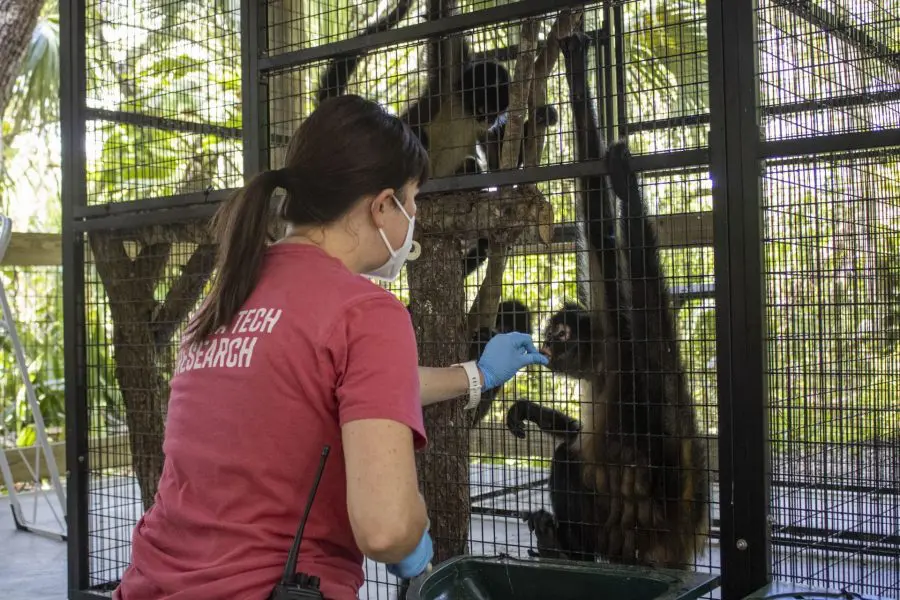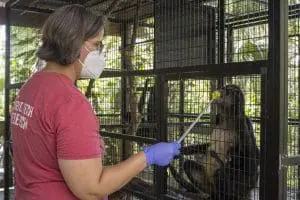

Florida Tech’s research is helping unlock the mysteries of primate evolution.
While taking a walk around our Rainforest Revealed loop, your interest may instantly be piqued by the antics of our black-handed spider monkey troop, our rambunctious cotton-top tamarin family, or our pair of elegant squirrel monkeys. While our primates are ideal ambassadors for their species, they’re also the key to understanding the evolutionary roots of behavior and cognition.
Since 2015, the Florida Institute of Technology (Florida Tech) has collaborated with our Zoo to study our spider monkeys’ behavior to further uncover how primates, including humans, evolved. Their work specifically focuses on the monkeys’ “complex social behaviors such as cooperation, behavioral economics, and social knowledge,” per their website.
Associate professor Dr. Darby Proctor, assistant professor Dr. Catherine F. Talbot, and their students conduct research in the Zoo’s Animal Cognitive Research Center, located just off the main boardwalk near the spider monkey complex.
In the last three years, Dr. Proctor, Dr. Talbot, and their students have learned a lot.
“One of the biggest surprises so far has been the degree of complexity in their social lives. We suspected it was complex based on their social structure, but some of the behaviors we have seen, especially regarding communication, have not been documented to this point,” said Dr. Talbot.
The team has observed new facial expressions, evidence of how they make decisions, and other surprising interactions amongst the troop.
 It’s also important to note that all of the research done with our monkeys is voluntary. Every monkey can choose whether or not they would like to participate in the research games or if they’d rather sit out. However, the troop members are usually very enthusiastic about working with the team. The prospect of playing puzzling games with tasty rewards is usually too enticing to turn down. While these activities are a routine part of the monkey’s day, the data being collected is contributing to cutting-edge research that’s helping answer centuries-old questions about primate evolution, which includes humans.
It’s also important to note that all of the research done with our monkeys is voluntary. Every monkey can choose whether or not they would like to participate in the research games or if they’d rather sit out. However, the troop members are usually very enthusiastic about working with the team. The prospect of playing puzzling games with tasty rewards is usually too enticing to turn down. While these activities are a routine part of the monkey’s day, the data being collected is contributing to cutting-edge research that’s helping answer centuries-old questions about primate evolution, which includes humans.
“For example, spider monkeys lost their thumbs during their evolution but also developed a very dexterous prehensile tail…Right now, we are working to figure out whether they have a side bias in using their tails similar to how people are typically right or left-handed,” explained Dr. Proctor. “This could help us learn more about the evolution of brain systems,” added Dr. Talbot.
The research conducted by Florida Tech will not only help contribute to the broader understanding of primate evolution, but it will demonstrate how other zoos can better care for their own spider monkeys.
For example, “we built them a fission-fusion habitat and we are seeing big increases in how active they are, which is one indicator of wellbeing. We are not done with our data analyses yet, but we think this type of housing has increased their ability to thrive under human care,” noted Dr. Proctor.
Our spider monkey habitat is made up of three habitats and the cognition center connected by a series of sky pathways. This allows our spider monkeys to act on their natural fission-fusion structure – the troop can separate into smaller subgroups and then come back together whenever they choose.
The Florida Tech group plans to continue researching the spider monkeys as much as possible since our Zoo is one of the only places in the world that conducts this research.
“There are an estimated 522 species of primates, 70% of which are threatened by extinction. Certain species are more commonly maintained under human care in part due to their ability to thrive under such conditions and in part due to the historical preference of research facilities to study certain species. Spider monkeys have not historically been one of those species,” said Dr. Talbot.
This adds even more excitement to the ongoing studies at the Zoo, since it is a challenging task to investigate spider monkey cognition in their native habitat.
Some upcoming projects include training the monkeys to use a touchscreen computer system, testing to see if the monkeys understand the concept of fairness, and further study the benefits of their prehensile tails.
Hopefully, our troop members will be the mon-key to further discoveries in this cutting-edge field.
Brevard Zoo is an independent, not-for-profit organization that receives no recurring government funding for our operating costs. Your generous support enables us to continue to serve our community and continue our vital animal wellness, education and conservation programs.